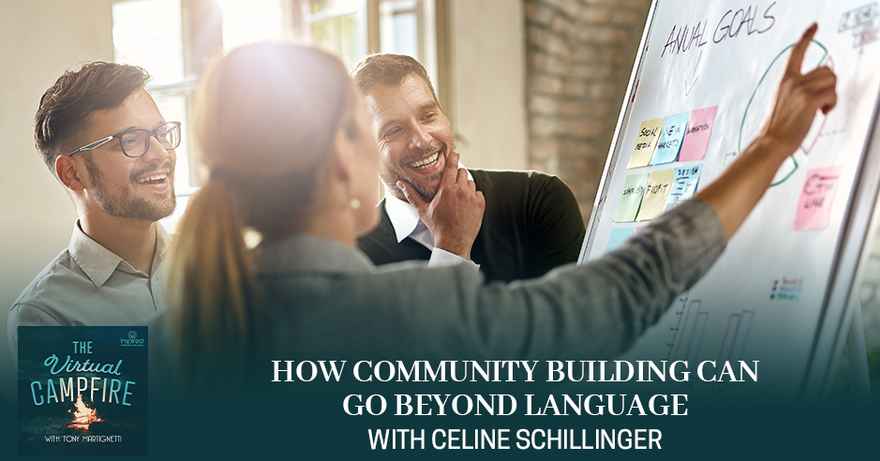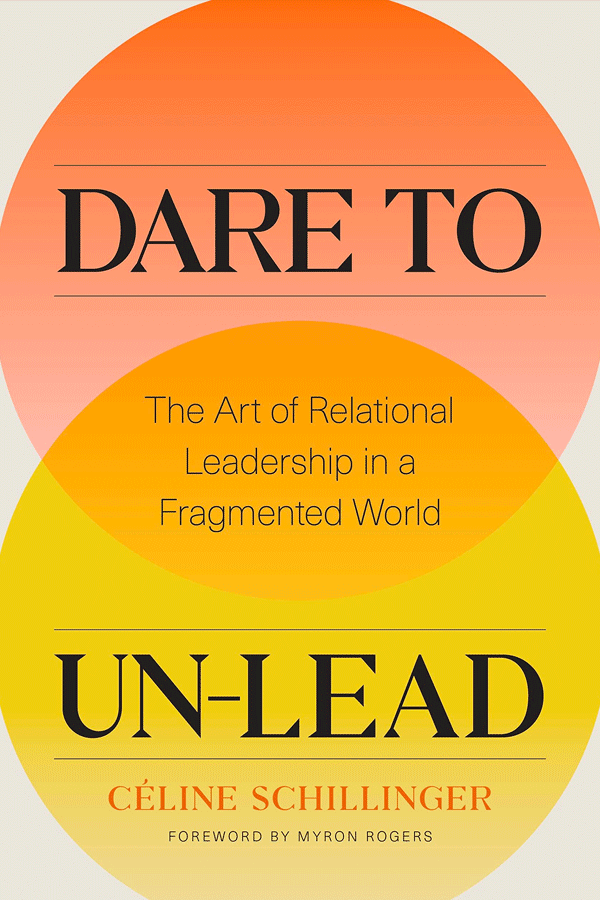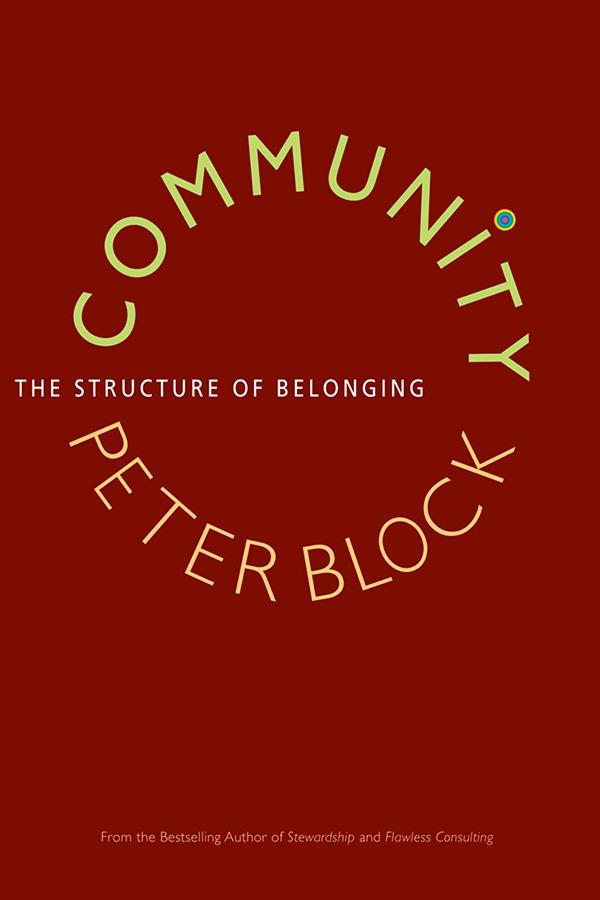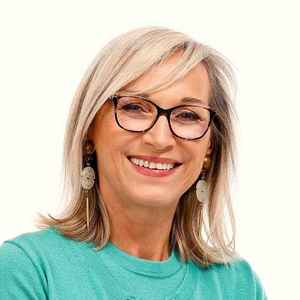How Community Building Can Go Beyond Language With Celine Schillinger

If you want to build an effective corporate team, you must adopt meaningful community-building strategies. However, you cannot simply rely on your communication channels for this. Most of the time, connections are built not just through company memos or emails. Tony Martignetti speaks with award-winning French entrepreneur and change practitioner Celine Schillinger, who shares how she goes beyond language to create healthy corporate communities. She explains how leaders should challenge themselves to connect with every single member of their team, not just those they find most interesting or valuable. Celine breaks down strategies for cultivating a sense of belongingness, diversity, and care in the corporate world plagued by competitiveness and toxicity.
---
Listen to the podcast here
How Community Building Can Go Beyond Language With Celine Schillinger
It is my honor to introduce you to my guest, Celine Schillinger. Celine is an award-winning French entrepreneur, change practitioner, and consultant. She has over 30 years of field experience working with both small and global organizations across several continents. A solid track record in transformation informs Celine's vision of change, engagement, and leadership. She’s been a blogger since 2013 and a TEDx speaker.
She was knighted by the French government for her workplace change efforts. Lessons from her journey in change are captured in Celine's first book published in June of 2022, Dare to Un-Lead: The Art of Relational Leadership in a Fragmented World. Celine is a rower. She has been rowing for many years in the Saône River. It's so amazing. I want to welcome you to the show, Celine.
Thank you, Tony. I'm delighted to be here. The Saône River is in the beautiful Lyon in the Southeast of France. There's a nice river and a few rowing clubs.
I can't wait to dig into your story. As we often do in the show, we explore people's journeys to get to where they're making a such big impact in the world. Looking at your intro, it's powerful to learn those little nuggets of things that you've done and your fantastic book. I'm thrilled to have you on the show.
Thank you so much. To me, it's a working progress. There's nothing to brag about. That's something I realized, especially while researching for this book. The more I learn, the more I realize the depth of my ignorance. It's humbling. I felt more self-assured when I was younger.
It's so true though. It's funny how you mentioned this because especially the writing process. You realize how much there is to know in the process of exploring. It's powerful.
It's first frustrating at the same time because you scratch the surface of topics. You realize that some people have been spending their lives on the very element of that topic, which seems super interesting. You can't spend your life on one part of it. My work is very much about synthesis or connections or weaving threads together. It's wonderful work. I love that. I love establishing connections but at the same time, it's frustrating because I feel like falling into every rabbit hole that's on my way.
It's hard. You are walking a fine line between being an expert and a non-expert and being a generalist. This tension has been described in a book called The Neo Generalist by Richard Martin and Kenneth Mikkelsen published a few years ago. It was interesting. There's this tension between wanting to know more and wanting to connect topics altogether.
It's ironic that you mentioned that because I do know that book and I have read that book. I'm not sure how popular it is in terms of how widespread it is but I have read it.
It's a great book. Richard Martin has kindly accepted to help me with the first version of my manuscript because English is not my native language. I wanted a manuscript to be good enough to be submitted to publishers. Richard kindly accepted to be my editor to correct my manuscript. That also was a humbling process because the first time the manuscript came back to me, it was all red with corrections. I was like, “Oh, my God.” That's part of the growth process, learning, understanding, and accepting that your work is always subject to improvement.
Understanding and accepting that your work is always subject to improvement is part of the growth process.
I'm ready to jump in and start exploring this. I love the fact that we're already in the groove. What we do on the show is explore people's journeys through what's called flashpoints. These points in your journey have ignited your gifts into the world. What I want you to do is share some of those moments along your journey that have made you who you are now. You can start wherever you like to, whatever you share what you're called to share, but think about the things that have made you into the person you are. Along the way, we'll stop and see what themes are showing up.
I'll start with a moment, which is referenced at the beginning, the preamble of the book. It's a moment I feel shaped by even before I existed. I don't know if you find it weird or not. My mother's mom was born in 1907 in the North of France. She started school at 7 and she had to stop at 9 because of the first World War there. There were intense bombings in Calais in the North of France. All schools got closed and so she stopped school and started working in a lace factory at age nine.
Child labor was already forbidden at that time. Nevertheless, some factories and companies still did it. She was hired as a reel picker. Her job was to crawl under the machines and pick reels. When the labor inspectors came to the factory to inspect work, she and the other kids were hidden by the owner of the factory in the toilets and asked not to speak so that they wouldn't be discovered.
I felt both horrified by this story. To her, it was something natural. It was part of her life and she went on with her life and did other things. It's something that grounds me in this experience of labor, a very real and heavy experience of work, which is easy to forget in our knowledge economy, working from home behind computers or working in for large and comfortable companies. I want to remain grounded in this history of work.
Good work is a privilege. If we can, if we are in a position to, it's our responsibility to extend this privilege to as many people as possible. I've been shaped by that. Also, the fact that she fought hard for the rest of her life to give a good education to her daughters. My mom, who was her 2nd daughter, was the 1st in her family to achieve higher education. I feel carried by this family or this history of strong women. I feel I'm bearing a part of this responsibility as well. That would be the first moment I feel defined by a moment in history.
Another moment that defines who I am was when I left my family and my country at age 23 to go to a country on the other side of the earth, which language I did not speak with no job and no plans except looking for a job and trying to do something with my life. I was curious. I was interested. I went to Vietnam. I was attracted by the culture and what I've read in books.
I eventually found a job. I settled in a family first. I stayed six months in this first family and started to learn the language, which is not easy because it has many tones, and immersed myself in this culture. It’s been a blessing and I've been carrying this with me for my whole life since then. This experience of cultural difference but also of the possibility of human connection beyond our differences, to me, was a real eye-opener. In the beginning, I felt everything was strange, different and unsettling in a good sense. I was excited by this difference.
Once I managed to establish connections, I realize that we could laugh together about similar things, experience friendship or desire, or share great moments over good food which is abundant in Vietnam. I have not stopped then from that moment on trying to live that experience again of bridging with people who are different from me, finding common points and connections. That was an important moment for me. I've kept those friends on, thanks to Facebook and the like, but also by going back there.
Another one that I often talk about is when later on in my career and working for this pharma company. I wrote an unsolicited letter to the CEO of that company and that letter triggered a grassroots employee movement, which emerged around the idea that we needed to and we could work together to increase the diversity of our company to make it more open, more modern, more representative of the diversity of the world of our customers and our employees.
I was working in Sanofi at that time, a big large pharma company that you know well. It had been years already. At some point, I felt suffocated by the lack of diversity and felt that instead of complaining about it, maybe I could do something about it, maybe even small. It was this idea of the letter. I didn't think long about it. I got the idea and sat on my computer, did it, and sent it. Eventually, this letter, this little thing crystallized something that was probably in the air and got me started in this corporate activist career that I've been pursuing for the past years now.
That's amazing. There are so many things about what you shared that I want to reflect back on you and recognize. This curiosity that you have is powerful. It transcends like a simple curiosity. It's a sense of like knowing that there are ways to connect with people beyond language. It's the ability to see people on a deeper level and know that there's more that we can share besides simple language. I speak in the book about one little thing in the Vietnamese language that struck me. That also has stayed with me for decades now. It's this different understanding of interpersonal relationships through language. Let me explain. In Vietnamese, there's not a single word to express the entity I, me, but there are many different words depending on whom you are talking with. The I that I will use with you, Tony, will be different from the I that I will use with my children or with the French President, for example.
I speak in the book about one little thing in the Vietnamese language that struck me. That also has stayed with me for decades now. It's this different understanding of interpersonal relationships through language. Let me explain. In Vietnamese, there's not a single word to express the entity I, me, but there are many different words depending on whom you are talking with. The I that I will use with you, Tony, will be different from the I that I will use with my children or with the French President, for example.
The I is different each time and each situation and the you is different too because the I is changed by the you and vice versa. When you think about it, this is amazing. The I and the you are relational. When I learned that at age 23, in the beginning, it made no sense. I thought, “Those people like to make their life complex or what.” It should be simpler. There should be like, I'm the I. It's me as an independent entity. With maturity, I understood better that maybe they are the ones who are right. There's no such thing as an I in isolation from everything else, especially everybody else. Always, everything is relational. Reality is relational.
It starts with that intention of what you're trying to put into the relationship that you have with other people if you're coming with a sense of wanting to be open and connect. Another word that keeps on popping up in my head is this caring with a desire to care for the person whom you're connecting with. It makes a big difference.
If you come in closed and you say, “I know all these things. I know what I know,” then you start to come in with this desire not to necessarily extend that courtesy or to understand, to seek, to be part of whatever that culture is. I'm not just saying in the Vietnamese culture but thinking about even your situation with Sanofi. You wanted to have a more diverse experience. You put the intention into the room and decided to take action because of that.
That's right. I have to be honest. There are people with whom I feel like building bridges and I'm curious about. There are others whom I'm not curious about and whom might don't feel like building bridges with. It is there that the effort starts because it's easy to go, explore, and be curious about people you like or people you find attractive or like-minded, but what about the others? How do you overcome this instinctive antipathy? It exists. We need to recognize and accept that. We don't live in a fantasy land where everybody can like each other. It takes a deliberate intention to make the world a little bit better rather than a little bit worse because it doesn't need to. It's already not that great.

I love what you're sharing because it's the sense of challenging ourselves to have those conversations with people that were not necessarily initially called to or thinking that we're not always going to have the most amazing relationships with everybody and that's okay. Also, channeling ourselves to step outside of our box and be okay to extend that curiosity to people who don't necessarily start to have that connection with. To say, “Maybe I'm triggered by somebody. Maybe a person whom I've interacted with at work or in the environments that I'm living in that cause me some friction.” It's worth having a conversation to see why.
Unless it's a discipline and you are deliberate about it, it may become harder the older you get because it's easy to fall into or to remain in the circle. We've built a social, validating circle we've built over the years. It's comfortable to stay there and keep it as it is. It's a choice. Some people are happy this way and it's fine. I like to challenge myself a little bit. It's funny. I've been doing that for a few days already.
It's comfortable to stay within the validating circle you've built over the years. While some people are happy to keep it this way, it's always better to challenge yourself a bit.
I volunteered to participate in a street performance with other volunteers for a few days. When we got together for the first time to learn about the performance and so on. We were like twenty people. You can't help but judge on people's looks, clothing, hairstyle, or anything. We try to assess each other and judge. Are they likely to think like me? Are they likely to like me? There are all those judgments and it takes effort to overcome that and to remain open and focused on this collective creation that we're doing together. When you are having fun and it's something enjoyable, it's easier to overcome those barriers.
I love what you shared but when you bring that idea into the workplace where sometimes things get a little more contentious, it's more challenging. We're leaning into this already where we're thinking, “How do we take these concepts into the workplace and help others to do that?”
You are right. The workplace is extremely challenging for that because it's filled with competition, a competition mindset, and competition for resources, for attention. There's intense pressure for short-term results, for delivery, for doing, or at least showing that you are busy. You're doing things. Maybe you're doing better than your neighbor, your colleagues, and so on.
It can be an unhealthy atmosphere, a toxic atmosphere in which behaviors are not linked to who we are, what we believe in, our values, and so on but are dictated by the environment and by this pressure even by the position we're in the system. That's what Barry Oshry says in his books. He says, “Things are not personal. Things are not related to individuals.” Things are systemic but it's hard to see, especially when we enter the workforce. We're young. We try to do our best and enter the game and play with what we understand the rules are. It's hard to change the rules even a little bit.
I love what you're sharing. It’s this feeling of how we bridge the gap between each other but specifically how we make sure that we don't take everything personally but also make sure that we build the right relationships with our colleagues so that we know how to relate well with each other. Before we go any further on this topic, I want to jump back into your story because I feel like there's more that we need to uncover along your journey to get to the work you're doing. You spent many years working at Sanofi and eventually decided to leave the nest and the corporate world. What prompted that? Tell me about that journey into your own work.
My own work in a way had started even at Sanofi when precisely, I started to try to change the rules of the game. Within the corporation, it's a challenging position but it's a rewarding one as well because you can do other things from outside. Being inside gives you some leverage and internal network and so on, which is also interesting. You understood that before Sanofi, I worked ten years in different environments, different industries even. I'm not a one-industry or one-company person. It's true that Sanofi has represented seventeen years of my professional life, which is a lot.
Many years into this work at Sanofi, I started to develop this practice around community engagement and community building which was very new in this company and other big pharmas. This approach was not just about gathering lots of people around an idea but it was around changing the nature of relationships, changing the interrelations, and making more people engaged in action, into co-action together rather than having a few people deciding for everybody else what needed to be done because this approach has become obsolete. It's too slow. It's not adapted to the complexity of our world. It's not agile enough. It's not giving people what they want now.
We claim more authorship and more ownership of things that happen to us. We want to be the co-authors, not just the victims of change. Our values in relation to authority or expertise have changed. Organizations need to adapt to that. There's no way we can pull people back into thinking as our grandparents did. We need to adapt as companies, as organizations, and as leaders.

I started this work within Sanofi on a succession of projects. This grassroots movement was first then a marketing project aimed at the outside world and finally, a large transformation project focused on industrial quality. That was the project that brought me to Boston. Across those years, I started to develop also a strategy, as a survival tactic, I would say. I started to develop an online presence, a blog. I started to speak at conferences, etc. so that I would tell my story and I would tell the story of the things I was developing.
Progressively I got more people asking for advice or up to a point where I felt maybe I could transform that into a job, do that for me, and bring those ideas to more organizations and more industries. I felt the resistance and the challenges I had faced were not unique to this company or to this industry. I had shown that even in a highly regulated sector, human change can happen and can be hugely profitable. Why not bring it to others?
That's why mid-2018, I left Sanofi, returned to France, settled in Europe, and launched my own company named We Need Social as we need connections. We need to contribute to this social capital to heal our society which is suffering from this fragmentation and division. I feel that the workplace can be a wonderful space for precisely this creation of links of connections. It's great for business. It's not just by idealism. I’m not speaking from an idealistic point of view but from a business pragmatic point of view. I'm trying to bring this to more people. It's been a few years.

Congratulations.
Thank you.
I love what you shared. There's something about that which is to say you start incubating these ideas. They're part of your journey already and now you start to realize, “There's more to this than what I'm already doing,” and the amount of impact you can have when you start to expand. Part of your journey to getting here is this sense of expanding beyond where you are and I hope you don't mind me saying this.
You start in a world where you see, “This is where I am,” and then you start to see, “There's more to life than what I'm experiencing. I got to expand.” You continue to expand and expand and before you know it, you realize the possibilities of what your work can be. That's where the growth is. You started feeling this sense of humbleness, which is understandable because we all are like, “Is this me? Am I doing this?”
It's true. It's probably a common life journey but when you start being self-centered for good reasons, you need to build yourself, your personality, who you are, and so on but then realize that the world is so much more than you yourself. It's all a system. It's a complex and living system to which you can contribute in a useful way or not. I find that developing an agency my own but also others with them, not for them. Developing agency in relationships with others has been my best growth movement in a way. Understanding through action and taking risks that I had more power than what I thought and what I was being told as well.
I could have a bigger impact on my life and on the world. It takes taking risks. I feel extremely privileged. I'm able-bodied. I'm healthy. I live in a beautiful, loving family. I have everything I need. I haven't been uplifted by this elite club. I've had to do things by myself and discover things by myself. Not everything has been given to me ready and nicely packed, which is also great.
A lot of people who are reading will feel that way. There's a sense that sometimes we got to do it for ourselves because it's not always going to be handed to us. There are so many things I want to talk to you about but I want to switch gears to the book. I'd love for you to share some insights about the rowing that you are doing. Maybe you can do it too here and share with us some insights about rowing and also some insights throughout the book.
Rowing is a beautiful sport. I discovered it late in life. I was already 30. It's too bad. I would've loved to experience it before. Nevertheless, it's been many years and I've loved it. I loved the friends made at the club. It's a very old club. I love the sense of gliding on the water, the team, and the partnership with other rowers. I talk about rowing in the book because the book is about collective leadership and so I draw this analogy between rowing and leading, not just because of teamwork. Although, it's extremely important but also for other aspects which touched me deeply.
For example, this sensory openness is key to go good rowing. When you row, you can't speak. You can't share instructions. You can't sense the water with your hands. Your whole body's busy, your legs, hands, and everything. You need to be in a state where all your senses contribute to your rowing. It’s not just your intellect, not computing the movements but also sensing the water, the speed, the rhythm, the rhythm of the others, the other rowers, etc.
It's the balance of the boat and so on. It’s a complete bodily experience, body, and mind together. It's fascinating. I find that in leadership too because leadership is relational. It's about creating relationships, creating a rich system, an ecosystem of relationships. You need to cultivate and nurture this sensory openness as well. Not everything goes through memos, instructions, data, and figures. A lot of it also goes through nonverbal communication, sensing others, sensing the environment, sensing what happens at the moment, those things.
Leadership is relational. It's about creating a rich ecosystem of relationships. Not everything goes through memos, instructions, data, and figures. A lot of it goes through nonverbal communication.
What you shared is so beautiful because I can viscerally feel it. There's something about it. People often think, “Emotional intelligence is what you described,” but it's not. It’s the emotional intelligence to the nth degree. You have to take it to another level that's a whole lot more than emotional intelligence. It's about this inner knowing that comes with it. I can talk with you all day but I feel like I have to make space for my last question, which I always ask my guests because I'm always curious about what books have shaped you. I have to ask, what are 1 or 2 books that have had an impact on you and why?
I was an avid reader until I got a mobile phone like many people. I've been shaped by many books. I remember Marguerite Yourcenar, the French author, L'Oeuvre au Noir is a master book. It's so deep. It takes place in the middle ages among those people, the alchemists. It's a whole philosophical journey. It's beautiful. This is one of the books I remember with passion because it was beautiful and marvelous. I have had a number of such emotions with other books as well but I'll speak about a book I read more recently.
This book is one of the books I love to quote, Community: The Structure of Belonging by Peter Block. It won't appear in the show but it's all marked and post-its. This book touched me deeply as well because it's about forming a community. How do you form a community? How is that an act of almost resistance? It’s resistance against those forces of fragmentation and division, which are extremely useful to some because there's profit in it. How do we resist by sticking together? Anger is one of the strongest emotions like distress and disgust. These are the emotions that fuel social media audiences, for example.
 Some people and corporations have an interest in fueling those feelings, anger, distress, disgust, outrage, etc. How do we resist that? How do we stick together? How do we form communities? This is probably the most important work of the 21st century, 22nd, and onwards. We'll need community. We'll need to stick together and create communities where people feel they belong in order to solve our big problems together with solutions that work for all of us.
Some people and corporations have an interest in fueling those feelings, anger, distress, disgust, outrage, etc. How do we resist that? How do we stick together? How do we form communities? This is probably the most important work of the 21st century, 22nd, and onwards. We'll need community. We'll need to stick together and create communities where people feel they belong in order to solve our big problems together with solutions that work for all of us.
When I speak about big problems, I have global warming in mind or the problems that Europe is experiencing with energy now and so on, in the US as well. We need to find ways to solve those problems together. Otherwise, what will happen is division, hate, and anger and we know from history what happens from that. I certainly don't want that future for our children.
We have to find ways to solve problems together. Otherwise, division, hate, and anger will take over.
That's beautiful. First of all, I want to pick up the Community book. It sounds fantastic especially. I love the way you brought it to life because we need this sense of belonging in communities. There's also a sense of wanting to be heard inside those communities and making sure that we have a voice that's being heard in those communities and not just feeling like, “We're in here. Now what?” It's a sense of feeling connected in those communities. I can't wait to dig in and add that to my list. Celine, I don't even know where to begin to say thank you so much for all that you've shared. Your stories and insights have been truly amazing.
Thank you for your great questions. I, too, could speak with you for the rest of the day but we'll have other opportunities. I would be happy to keep the conversation going with you and with the readers. We can continue and talk on LinkedIn or every other network. I'd be happy about it.
You set me up for the next thing I'm going to mention, which is to say, where can people find you? What's the best place to reach out if they want to?
People can find me on LinkedIn, Twitter, Instagram, and my website, WeNeedSocial.com and in the book obviously, Dare to Un-lead.
Go pick up the book. It's fantastic. You'll love it. Go and consume all of the stuff that Celine puts out. It's magical that you know the work that you're doing and keep up the amazing work.
Thank you, and you, too.
Thank you. Thanks to the readers for coming on the journey.
Important Links
- Celine Schillinger – LinkedIn
- Dare to Un-Lead: The Art of Relational Leadership in a Fragmented World
- The Neo Generalist
- Sanofi
- L'Oeuvre au Noir
- Community: The Structure of Belonging
- Twitter – Celine Schillinger
- Instagram – Celine Schillinger
About Celine Schillinger
 I grew up in Bordeaux, France in a family passionate about art, culture and travels. I studied political science as the general interest appealed to me, but felt attracted by the pace of private business. So I added corporate communications to my curriculum then got a first job in a small IT business whose main market was China.
I grew up in Bordeaux, France in a family passionate about art, culture and travels. I studied political science as the general interest appealed to me, but felt attracted by the pace of private business. So I added corporate communications to my curriculum then got a first job in a small IT business whose main market was China.
This raised my interest in business operations and Asia. I left France aged 23 to look for a job in Vietnam. A small business consulting firm hired me as their country representative. Four years later I joined a client as a sales manager for Asia Pacific, before moving to China as the general manager of their radio business. Overall, this has been 10 years in non-pharma businesses, in Asia Pacific.
In 2001, I joined Sanofi Pasteur, the vaccine division of Sanofi in France. What attracted me there were the human values and care for protection I felt during the interviews. Over 17 years, I held different positions across International Human Resources, Int’l Business Operations, Strategic Planning, Project Management, Marketing and Quality.
In 2011 I started an exploration of activism, co-creation, social networks, leadership transformation and how all of this can help business performance. Not always easy in a strictly regulated industry… but my work has triggered tangible and significant change globally and received multiple awards. Before founding We Need Social, I was Sanofi Pasteur Global Quality Head of Innovation and Engagement.
Love the show? Subscribe, rate, review, and share! https://www.inspiredpurposecoach.com/virtualcampfire


0 comments
Leave a comment
Please log in or register to post a comment